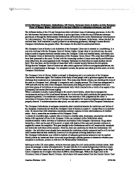To what extent have international courts and tribunals been successful in upholding human rights?
To what extent have international courts and tribunals been successful in upholding human rights?
There are several International bodies that are responsible for upholding Human rights. In this essay I will attempt to examine and analyse the effectiveness of international courts and tribunals in upholding human rights.
The first International court is the ICC. The ICC has achieved some limited success with human rights cases, for example the International Criminal Court ruled against Russia’s Human rights abuses in Chechnya. In 2005, the European Court of Human Rights ruled that Russia committed serious abuses, including torture and extra-judicial killing, in Chechnya. The ruling came after the Strasbourg-based court heard claims brought by six Chechens. The judges, who included one Russian, were unanimous in a ruling that is angered the Kremlin. Russia accused the West of hypocrisy and double standards in its criticism of Russia's conduct in Chechnya. It was the first time an international court has found Moscow guilty of serious violations in Chechnya. The judges said Moscow had breached an article of the European Convention on Human Rights guaranteeing the right to life. The six plaintiffs received approximately £94,000 in compensation from the Russian government. However, this small fine is very unlikely to act as a credible deterrent to Russia committing human right abuses in the future. Russia is a significant actor in the global political arena.









